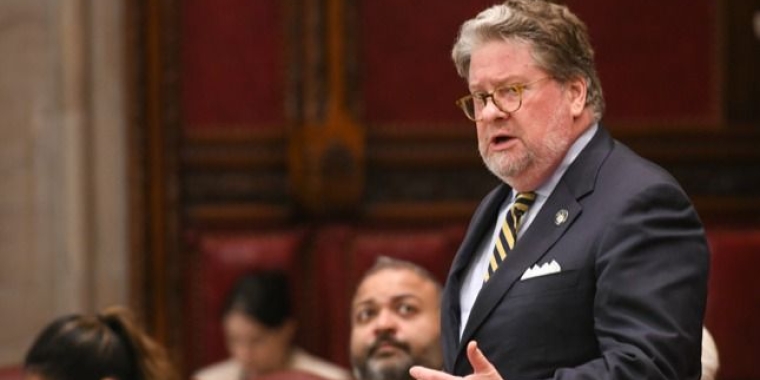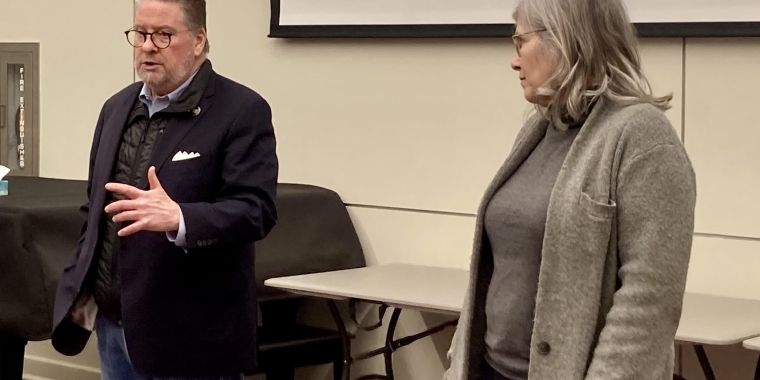
Harckham’s Packaging Reduction Bill Passes in Senate
June 7, 2024

State Senator Pete Harckham on Senate floor
Albany, NY – New York State Senator Pete Harckham announced that the Packaging Reduction and Recycling Infrastructure Act (PRRIA) passed in the Senate today. The legislation (S.4246D), which received support from Harckham’s colleagues and wide approval from New Yorkers, will require companies to reduce their overall packaging use, improve the recyclability of their products, fund recycling and reuse infrastructure, financially support municipal recycling programs, and reduce toxins in packaging.
Assemblymember Deborah Glick sponsored the Packaging Reduction and Recycling Infrastructure Act in the Assembly, where the bill (A.5322D) has not been voted on yet.
Harckham added, “I thank Majority Leader Stewart-Cousins and my Senate colleagues for their support of this bill, and also offer my gratitude to the many groups and stakeholders that shared their ideas and concerns about the bill over the past two years.”
In New York, each resident creates on average five pounds of trash every day, much of it in the form of packaging and recyclable waste. Currently, municipalities are responsible for the collection, transportation, sorting and processing of waste and recyclables. High recycling costs have led to increased taxes and recycling limitations; in addition, the New York State Department of Environmental Conservation (DEC) notes that the state’s 25 municipal solid waste landfills could be full within 15 years.
Decreasing and eliminating packaging waste is best achieved through Extended Producer Responsibility (EPR) and placing the end-of-life costs for plastic packaging and recyclable waste on the producers of the products themselves. In December 2022, New York State’s Climate Action Council, created through the Climate Leadership and Community Protection Act (the state’s landmark, nation-leading environmental protection law) recommended new waste approaches like EPR for meeting the State’s climate goals. The DEC’s solid waste action plan noted that packaging reduction legislation was a top priority.
PRRIA was crafted in consultation with environmentalists, shop owners, farmers, waste haulers and garden club members, as well as leaders from big corporations and business groups, any of whom weighed in with their ideas and concerns during a joint public hearing held by the Environmental Conservation committees of the Senate and Assembly last year. The bill’s timeline calls for producers / companies with annual net revenue over $5 million and responsible for more than two tons of packaging waste annually to reduce their packaging by 10% of weight within three years and 30% of weight within 12 years.
Moreover, PRRIA requires specific standards for post-consumer recycled material for packaging. Within two years of the adoption of the PRRIA, glass should be at least 35% post-consumer recycled content, paper carry out bags should be 40% and plastic bags should be 20%.
In addition to small businesses with under $5 million in revenue, producers exemptions in PRRIA include dairy co-ops with fewer than 50 employees and nonprofit engaged in the delivery of medically tailored meals. Producers that can demonstrate a reduction in packaging up to over 10 years prior to the bill’s signing can credit those reductions against the legislation’s packaging reduction targets. Exempt products include: medical and supplement product packaging, baby formula, biologics packaging and packaging for poisons and hazardous materials.
The PRRIA makes it mandatory for the eligible producers for consumer packaging and recyclable waste to register with a PRRO, or a Packaging Reduction and Recycling Organization, within 18 months of the bill’s enactment and create a plan within two years for submission to an advisory council to gauge compliance with the new packaging and recycling rules. This plan, which is submitted to the DEC, will detail efforts to reduce toxic substances in packaging, increase recyclability and support waste reduction. The PRRO, a non-profit, will collaborate with municipalities and private haulers, ensure producers meet reduction and recycling targets, and collect fees.
PRRO board representation includes stakeholders from various industries (manufacturers and producers, waste hauling, recycling, retail), environmental justice advocates, labor reps, government officials, consumer advocates and public health experts. Harckham’s bill supports smaller businesses with technical assistance from the PRRO regarding affordable alternatives to non-compliant packaging.
If a producer’s plan is not approved, the producer may be subject to penalties for noncompliance: $1,000 per day for each violation. The DEC, Attorney General and recycling inspector general are authorized to investigate, audit and impose penalties to ensure accountability and compliance.
Judith Enck, former EPA Regional Administrator and president of Beyond Plastics, said, “Passage of this transformational plastics reduction bill will protect people's health and the environment and save tax dollars. There was massive opposition by the plastics, chemical and fossil fuel industries, which was overcome by significant public support for the bill. Immense thanks to Senate Majority Leader Andrea Stewart Cousins and bill sponsor Senator Pete Harckham for passing this bill which will reduce plastic pollution in the Hudson River, the Bronx River, Long Island Sound and other cherished water bodies.”
Adrienne Esposito, executive director of Citizens Campaign for the Environment (CCE), said, “This is a tremendous victory and a game-changer in the effort to combat our state’s solid waste crisis. Finally, corporations will have to take out their own trash! Each year companies ship billions of items with excess packaging, exacerbating the solid waste crisis, yet they took no responsibility for managing the waste they create, until now. Municipalities and taxpayers will no longer have to solely shoulder the financial burden of paying for packaging waste and unrecyclable materials. Once signed into law, the Packaging Reduction and Recycling Infrastructure Act will reduce the amount of packaging manufacturers use and make the packaging easier to recycle and less toxic. This bill will increase recycling rates and save local governments and taxpayers millions of dollars each year. We literally could not afford to wait any longer. CCE commends Senator Harckham and Assemblymember Glick for their stellar leadership and for holding manufacturers accountable. Now, we look forward to working with Governor Hochul to get this bill over the tipping point and signed into law.”
Pat McClellan, director of policy for the New York League of Conservation Voters (NYLCV), said, “To achieve our goal of zero waste, New York State must adopt policies to create a circular economy that prioritizes recycled and recyclable materials and incentivizes the use of less packaging in the first place, and that is exactly what the Packaging Reduction and Recycling Infrastructure Act does. We applaud Senator Harckham for leading the way and the Senate for passing this important measure. Now, with the legislative session coming to a close, we urge the Assembly to pass this bill before it’s too late.”
Caitlin Ferrante, conservation program manager of the Sierra Club Atlantic Chapter, said, “As New Yorkers, we are drowning in our own packaging waste and the manufacturers who created this mess have not been held responsible for recovering or recycling their products and have little incentive to reduce the packaging of those products. Instead, municipalities bear the brunt of handling the collection, transportation, sorting, and processing of waste—materials which they had no control or influence over in the first place. Senator Harckham and Assemblymember Glick deserve tremendous credit for negotiating a comprehensive waste reduction policy for New York that, through a circular economy, will see a reduction in packaging, toxics, landfill pressure, cost burden on taxpayers, and the significant toll that our current waste system has on the climate and public health. We look forward to the Governor’s signature.”
Stephen J. Acquario, executive director of the New York State Association of Counties (NYSAC), said, “As global commodity markets have collapsed and expenses to collect and process waste have increased, local governments have been forced to pay into an antiquated system flooded with materials we cannot recycle. By requiring producers to manage the end-of-life recycling of their packaging, this legislation will improve recycling rates, reduce contamination, and save taxpayers money. Additionally, by banning the use of toxic substances like PFAS and lead in packaging, it will protect the health and safety of all New Yorkers. We commend the Senate and urge the Assembly to pass the PRRIA before the end of the 2024 Legislative Session to provide relief to local governments and protect our environment.”
related legislation
Share this Article or Press Release
Newsroom
Go to Newsroom
Harckham, Rosenthal Bill Would Trim Taxes for First-Time Homebuyers
February 21, 2025


